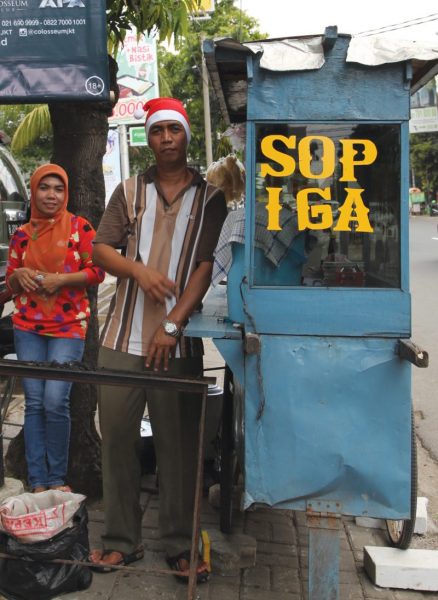On the streets of dining and entertainment district Kemang, one can often see the familiar face of Ami Fahmi working two jobs a day to make an honest living.
Originally from Jakarta, Bang Ami is a hard-working and happy-go-lucky guy. In the mornings, from 6-9.30am, he works as a tukang ojek (motorbike taxi driver) on Jl. Bangka Raya, waiting for customers outside of the Bangka market to take shoppers back home. When he doesn’t have any customers, he helps out as a parking attendant at the lots nearby.
The fuel prices have gone up by over 30% and when asked what he thinks of the change, Bang Ami takes a relaxed approach. “The rise of BBM prices doesn’t affect me too much. As long as the BBM is there, I’m happy, and it’s up to the customer what they want to pay me.”
“I’ve been an ojek driver since 1997 – I earn around Rp.40,000, and on a good day I can take in over Rp.50,000,” he tells me as he starts preparations in his warung sate later on that morning.
At 10.30am, Bang Ami begins to set up shop on Jl. Kemang Raya, about 200m away from where he works in the mornings. He has a kaki lima (mobile food store) selling satay, soto betawi (beef soup with coconut milk) and sop iga (clear beef soup) to hungry customers, including the police officers of Kemang Raya, whose base is across the road. His wife is the cook and instigator of this business, using her mother’s recipes to create a fusion of Madura and Betawi flavours. Business is good—selling their quota of 30 portions a day, bringing in a profit of Rp.200,000-400,000—but they do not feel at ease.
“We’ve been moving a lot around Kemang lately,” Ami’s wife Maida tells me. “We get shooed away by the shop owners over territory disputes. Sometimes we’re on that side of the road and sometimes down there, and today we have to sell our food on this side,” she explains as she points to the different places, today setting up in a less than ideal spot without shade.
It seems the police officers who frequent their kaki lima do not want to get involved in these disputes and it’s left up to them to find a solution. Ami and Maida often feel confused, as they park their stall on pavements in between shops, and never on the actual shops’ properties, yet they still get told to vacate.
Due to popular demand however, Ami and Maida have opened up a second outlet at Box Mart, further down Kemang Raya, but here they also face similar territory disputes. Ami and Maida will continue to work this way until they have enough money to open up a permanent warung somewhere. Ami explains that he lives by his rule of model nekad (just be brave model) and tries to enjoy his days for the betterment of his wife and two children, two and 12 years of age, whom he hopes will become educated and smart people in the future.




